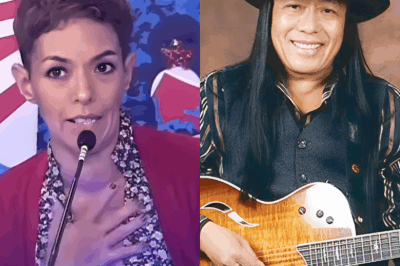Lotlot, Matet, and Siblings Break Silence on John Rendez’s Tribute to Nora Aunor — “Those Words? They Know the Truth…”
As the Philippines continues to mourn the loss of one of its most beloved cultural icons, Nora Aunor, a recent tribute by her longtime companion John Rendez has sparked intense discussion across the nation. While many found his heartfelt message touching, others — especially Nora’s children, Lotlot de Leon, Matet de Leon, and their siblings — have now broken their silence, offering a response that adds layers of complexity to an already emotional story.
A Tribute That Stirred Emotions and Controversy
Shortly after news of Nora Aunor’s passing spread, John Rendez took to social media with a deeply emotional tribute. Describing Nora as his “guiding light,” “soulmate,” and “eternal superstar,” his post was poetic and nostalgic, capturing the hearts of many fans. Rendez wrote:
“I lived every day by your side not as your fan, but as someone who knew your soul. Now that you’re gone, a piece of me has gone too.”
These words prompted an outpouring of sympathy and condolences. Yet, for some — particularly those familiar with Nora’s family dynamics — the tribute raised questions rather than comforted.
Lotlot, Matet, and the Siblings Speak Out
Nora’s children, who had largely remained quiet amid public speculation, have now responded, and their statements reveal a complicated mixture of pain, frustration, and a call for truth.
Lotlot de Leon, known for her reserved nature when it comes to family matters, carefully yet firmly addressed the tribute:
“Those words? They know the truth. And so do we.”
Matet de Leon, often more outspoken, did not hold back:
“Some people speak loudly in death to cover the silence they gave in life. Let’s not pretend now.”
Their words have stunned fans and critics alike, hinting at long-standing emotional wounds and perhaps a deeper rift in the family — wounds that have been carefully hidden from the public eye until now.
The Family Rift Behind the Spotlight
Nora Aunor’s illustrious career as the “Superstar” of Philippine cinema united countless generations through her iconic performances. But behind the scenes, her personal life was marked by emotional distance and strained relationships — particularly with her children.
In past interviews, both Lotlot and Matet have tearfully spoken about feeling excluded from their mother’s private world, especially as Nora grew closer to people unfamiliar or even unknown to her children. This growing divide left them feeling isolated.
John Rendez, a rapper-actor with a more recent and less visible presence in showbiz, became a permanent part of Nora’s life in her later years. To her children, however, he was often seen as an outsider — a figure whose true role and influence remained unclear and sometimes questioned. Yet, these concerns were rarely voiced publicly until now.
With Nora’s passing, these unspoken tensions have resurfaced, leaving the public to grapple with a complicated picture of grief, loyalty, and family dynamics.
Public Reaction: A Nation Divided
The tribute and the children’s response have sparked a wave of mixed reactions online. Many fans and supporters defend John Rendez, praising his years of loyalty and companionship with Nora Aunor. They see his words as a genuine outpouring of love from someone who shared a deep connection with the icon.
Others, however, empathize with Lotlot, Matet, and their siblings, suggesting that proximity to Nora in her final years does not necessarily equate to emotional sincerity or genuine care.
One commenter wrote:
“It’s easy to cry in front of a camera. But the real tears were shed by the ones who waited for a mother’s love in silence.”
Another echoed the sentiment:
“The truth always finds its way. Nora Aunor may be gone, but her children’s pain still echoes.”
These reactions underscore how grief and love can be tangled in complex ways — especially when public personas and private realities collide.
Beyond the Drama: Reflections on Fame and Family
What makes this story resonate beyond celebrity gossip is its reflection of a common reality for many public figures: the barriers fame can create between an artist and their family. Nora Aunor’s artistic legacy remains untouchable, yet even her death cannot fully reconcile the fractures in her personal relationships.
Her children are no longer seeking attention or public sympathy. They are asking for honesty — a truthful reckoning with what truly happened behind the scenes, away from cameras and tributes.
In the end, their voices remind us that no matter how bright a star may shine on screen, the human heart can carry shadows that only time and truth can heal.
News
Ellen Adarna and Derek Ramsay Rumored to Have Split—Cristy Fermin Sets the Record Straight
Recently, social media and several online forums have been abuzz with speculation regarding the alleged separation of celebrity couple Ellen…
😱 “Shocking Family FEUD? Ruffa Gutierrez BLASTS Barbie Connection in Explosive Sibling Clash
Ruffa Gutierrez Isiniwalat Naguguluhan Sa Relasyon Nina Richard Gutierrez at Barbie Imperial Biyernes, Hunyo 13, 2025 Agad na naging usap-usapan…
“What Really Happened to Freddie Aguilar’s Inherited Home? Megan’s Quiet Move Sparks Fan Outrage, Hidden Deal Now Exposed!”
MEGAN ADMITS THE TRUTH: “I Was the Reason Freddie Disappeared” — A Nation Demands Answers MANILA, Philippines — In a…
No one saw it coming: Red Sternberg is preparing to step back into the spotlight after years of silence, with a major deal that could completely turn his career around – Michael Flores speaks out for the first time! ‘I’m not coming back to play – I’m coming back to win!’ Red Sternberg declares with confidence.”
Michael Flores reveals Red Sternberg’s plan for showbiz comeback Michael Flores heartbroken over Red Sternberg’s death. Michael Flores (right) on…
Did She Just Meet the In-Laws? Bea Alonzo Spotted Getting Cozy with Vincent Co’s Famil
Bea Alonzo spotted with mom of rumored beau Vincent Co Bea attended an event with Vincent and his family. Ikinatuwa…
My Name Wasn’t in the Will… But What He Left Me Was Priceless” — Maegan Aguilar Uncovers Freddie’s Final Gift 💔✨ “He didn’t leave me money. He left me the truth… and that changed everything.”
“My Name Wasn’t in the Will… But What He Left Me Was Priceless” — Maegan Aguilar Explores Freddie’s Final Gift…
End of content
No more pages to load












